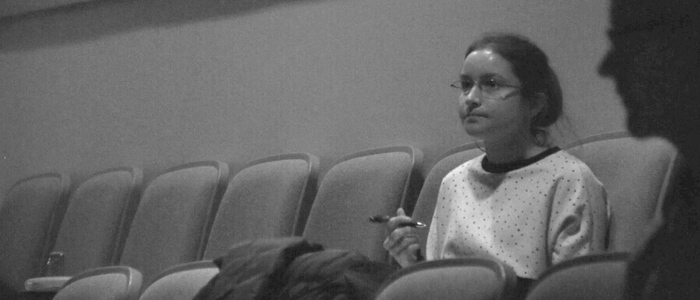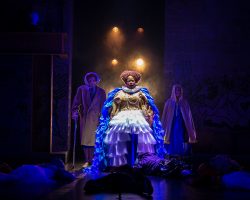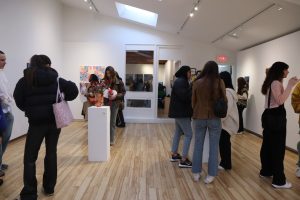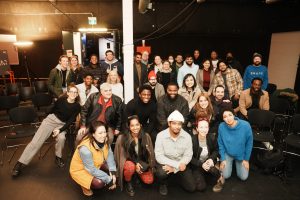Indigenous Representation in Canadian Dance and ‘Old Habits’
Amy Hull (BFA 2020) is a Mi’kmaw and Inuk dancer and choreographer, currently pursuing her Master’s Degree in Dance at York University. As an undergraduate student, she was asked to update the Dance Department’s land acknowledgement with language that speaks truer to the realities of arts-making on lands that have a rich history of storytelling before colonization. The recording she made is still used before dance performances at York today. In her final year as an undergrad, she left audiences in tears and awe with her piece Old Habits, inspired by her experiences growing up in a western culture, removed from her Indigenous heritage.
CLICK HERE to watch our interview with Amy Hull and see segments from Old Habits
Now Hull is taking her lessons from Old Habits a step further to confront narratives about Indigenous people in the Canadian dance canon. We interviewed her about her experiences as a choreographer and dance scholar:
AMPD: Let’s start by revisiting Old Habits. Now that some time has passed, what were your major lessons and takeaways from that?
Amy Hull: A major lesson I took from my work Old Habits is that I don’t necessarily need to be afraid to dive in and create “controversial” choreographies. The support I received from my professors and colleagues was overwhelming.
AMPD: How did they react to it?
AH: I found that my professors and classmates were not at all immediately jumping to the false conclusion of “this is meant as an insult to the Catholic Church”. Rather, they had a lot of questions and were really looking deeply into the piece to understand the depth of the message I was sharing with the work. I made one of my professors cry as the message really resonated with her, and another professor referred to my work as the most “mature” piece he had seen at Dance Innovations.
AMPD: Why did you decide to continue your studies within the Dance Department and pursue a Master of Arts?
AH: I felt that I had much more to contribute to the field of Dance Studies than the social transgressions I may have committed with Old Habits. Some ideas do not need to be articulated in words or in the form of academic research, but others very much do.
“We acknowledge that our creative presence here is a privilege and responsibility, not to be taken lightly.”
– Excerpt from Amy Hall’s updated land acknowledgement
AMPD: You have been active as changemaker on York’s campus, you re-wrote and recorded the Dance Department’s land acknowledgement, and your peers have admired your no-B.S. approach to injustices on campus. What do you attribute that determination to? Have you always possessed it, or did you “flick a switch” at some point in life?
AH: I would attribute my determination to a flick of a switch, as you put it. This switch was flicked when my cousin was murdered in 2014 and I came to realize that these “political issues” are in fact very personal, very real, and marginalized people including Indigenous women are dying every single day as a result of the violence of settler-colonialism. These are not issues of the past but issues of the present and they are not simply abstract but manifest in very, very real ways.
AMPD: How does dance allow artists to process traumatic moments in their histories?
For my current MA research, I am problematizing the tradition in Canadian ballet of non-Indigenous choreographers creating works involving Indigenous death and trauma on non-Indigenous dancers for non-Indigenous audiences as a main plot point. These non-Indigenous works are then often praised in the media as some of the most important “Canadian” works in history, and often lack cultural sensitivity.
This then begs the question of how can I, as an Indigenous dance artist, reclaim my own trauma within my creative work? I’m starting to explore this as I move forward with Old Habits and investigate ways that I can reclaim this trauma, and create work about it, without creating “trauma porn” or work that is exploitative of this trauma, but rather creates a space in which I can heal along with the audience.

Amy Hull takes notes at a rehearsal for Old Habits
AMPD: What are the unanticipated challenges of transitioning from undergraduate to graduate studies?
There is definitely a very large academic and theoretical gap to fill in between degrees in AMPD. This means I am having to do extra homework on top of all my readings and assignments to make sure I’m understanding theories we are discussing in class and know who relevant scholars are.
AMPD: What advice do you have for a prospective dance student who wants to bring positive change to the world?
I would tell a prospective dance student that if you feel like you don’t fit in with the mainstream culture within your dance milieu, whether that’s because you aren’t trained in ballet or modern or you have ideas that seem a bit “avant-garde” or transgressive, good. Make the space for yourself within the dance community and be assertive.


